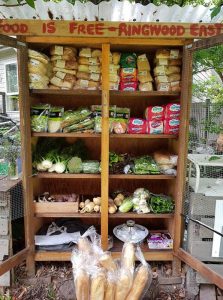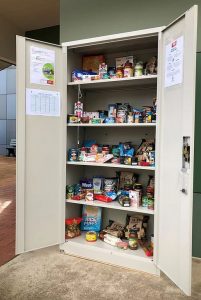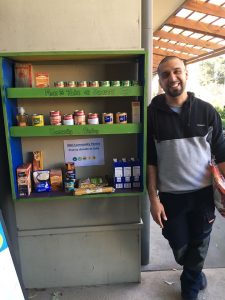Food is free and community pantries
‘Food is free’
‘Food is free’ is a movement which started in 2012 in Austin, Texas. As they discuss on both their website and their Facebook page, their aim is to grow both community and food. For example: “We are creating models for how to grow food in unused public spaces that provide opportunities for people to experience fresh, healthy, organic food, and the power of community when we come together for a cause that’s greater than ourselves.“
The first ‘food is free’ initiative in Australia started in 2014. As they say on their website, they are a group “benefitting all Ballarat (Australia) citizens with a focus on those experiencing disadvantage and [with a] core purpose of assisting and promoting food security and community cohesion and inclusion.” And, as they say on their Facebook page, “come along and feel free to take whatever you need.“
 There are currently at least 9 ‘food is free’ initiatives in North East Melbourne (see a map of where they are):
There are currently at least 9 ‘food is free’ initiatives in North East Melbourne (see a map of where they are):
- Blackburn: “This is a social permaculture initiative to share resources, distribute surplus, create connection, help other people, and strengthen community ties.“
- Diamond Creek: “Local residents have begun using this as a space to share what they are making and doing during [the Covid] lockdowns.“
- Hurstbridge: One of a number of related food-related initiatives at the site (food swap, community garden and seed library).
- Kilsyth: “For all neighbours to share in: unopened pantry, toiletries & sanitary items; fresh garden veggies & fruits; and bakery items.“
- Mitcham: Like many of the others, they collect donations from various local businesses to help keep the pantry full and also rely on community donations from neighbours.
- Nunawading: “It was borne out of a desire to give back and build community connections through the sharing of surplus food and produce.“
- Ringwood (on Maidstone): Like many of the others, it has regular deliveries of bread.
- Ringwood East: “People leave surplus from their pantry or garden. It is all about community and contribution. Generosity, in giving and receiving. All are welcome. It is all free. Located on the fence line and open 24/7.“
- Warrandyte: “The food has all been donated— it’s fresh and free to anybody who needs it. There are gold coin donation boxes to help people feel more comfortable taking the food.“
‘Grow free’
A similar movement is ‘Grow Free’, who say they are “dedicated to making our food locally grown, organic and free” and “all about growing and giving away free organic, heirloom veggie/herb/flower seedlings for people to get their garden going“. The movement started out in Adelaide but now has a foothold in North East Melbourne, including a cart at Lalor. To find out more, either join their Facebook group or listen to a ten minute interview with their founder or read an interview on the ABC News website.
Community pantries
 Community pantries are similar to ‘food is free’ sites except that they often focus on non-perishable (rather than perishable) food and tend to be co-ordinated by voluntary organisations (rather than individuals). The pantries are typically accessible 24 hours a day, seven days a week, require no appointments and are open to whoever needs food. Their philosophy is give what you can, take what you need, with people able to donate to the pantry as well.
Community pantries are similar to ‘food is free’ sites except that they often focus on non-perishable (rather than perishable) food and tend to be co-ordinated by voluntary organisations (rather than individuals). The pantries are typically accessible 24 hours a day, seven days a week, require no appointments and are open to whoever needs food. Their philosophy is give what you can, take what you need, with people able to donate to the pantry as well.
There are currently at least 17 community pantries initiatives in North East Melbourne (see a map of where they are).
The Food Collective organises a number of pantries in Banyule and Nillumbik. Their 24/7 pantries are in Diamond Creek, Eltham, Hurstbridge, Panton Hill, Rosanna and Strathewen.
There are also community pantries in Blackburn North, Brunswick (both Albert Street and De Carle Street), Fawkner, Heathmont, Kilsyth/Montrose and Thornbury (Smith Street).
The Albert Street Community Cupboard have produced a useful set of guidelines about what donations they will accept, namely:
- Non-perishable foods that are:
- Labelled in original packaging (including ingredients/allergens).
- Unused and unopened.
- Within use by date and within 6 months of best before date.
- Fresh produce that is:
- Whole/not cut.
- Not mouldy or rotting.
- Does not need refrigerating.
Neighbourhood houses
Finally, some neighbourhood houses in North East Melbourne are beginning to give away free food,  including:
including:
- Greenhills (Greensborough): they have a food relief centre that offers fresh food, pantry items and toiletries on Thursdays and Fridays each week (except between Christmas and New Years).
- Reservoir: they have a pantry, which is simply an open cupboard fixed to the outside wall to which people can either donate, or freely take out, any non-perishable food. Monday to Thursday, they are open for emergency food relief. On Monday nights and Thursday mornings, they give away free bread. Every other Tuesday, they have a delivery of fresh produce. On the 2nd Tuesday of every month, they have a morning tea. And on the 4th Wednesday of every month, they have a free lunch.
- Thomastown: they have a pantry, which operates Monday-Friday, 9am-9pm plus Saturdays 9am-5pm. It is located in the foyer of the Thomastown Library and is accessible thanks to the library’s ‘click and collect’. They have also set up a table in front of the Thomastown Library on Fridays from 11am-1pm with fresh fruit and veggies.

There is also a Telcoma Food is Free. http://www.facebook.com/foodisfreetecoma.
We have a food is free laneway in Portarlington too! It’s well used and loved by the community.
https://www.facebook.com/Portarlington-Food-Is-Free-180088435993103/
What great initiatives!